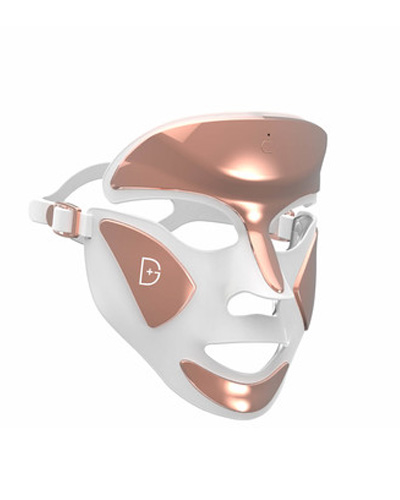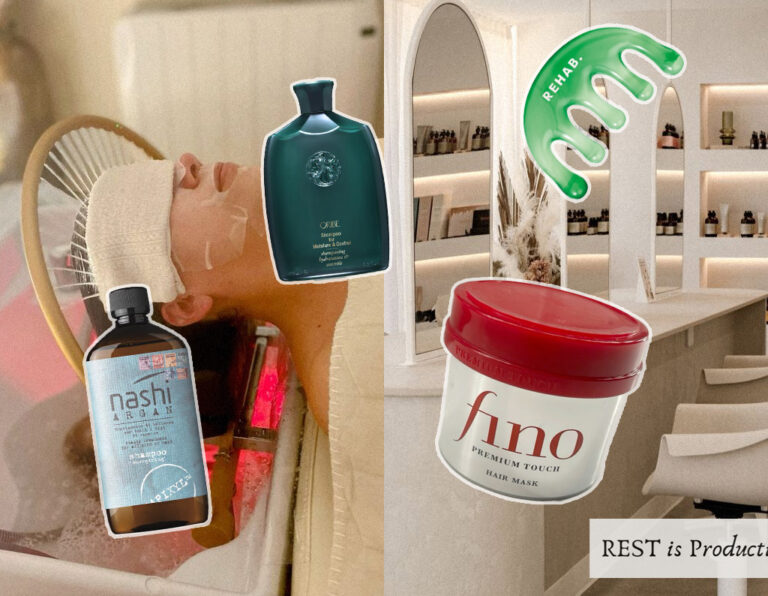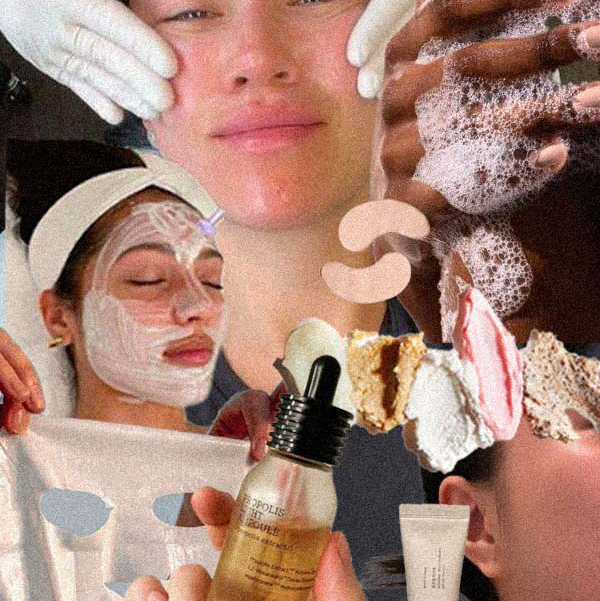My Unbiased Review of the Dr Dennis Gross LED Mask
I’ve suffered with my skin since I was a teen. It’s one of the things I’m most conscious about. & despite being nearly 30 (& my mum promising my my acne-prone skin would heal as I aged), I’ll always have an active breakout, usually in my T-Zone or around my chin. Admittedly, I’ve have spent more than I’d like to remember searching for a fix. I even avoid things that trigger my acne (but sadly, do bring me a lot of joy), like gluten, dairy, soy & too much sugar. So the thought of spending over £450 this futuristic Optimus Prime-inspired device from Dr Dennis Gross wasn’t appealing in the slightest. Interestingly, I have actually tried LED therapy at clinics before – most offer it as an add-on with a facial (usually with the Dermalux Flex MD light), but I never saw any noticeable improvements as I wasn’t having it done regularly enough.
But, soon enough, the magic of the TikTok algorithm did its thing. I was presented with video after video of incredible before and afters thanks to the Dr Dennis Gross DRx SpectraLite Faceware Pro (catchy, I know). Low & behold, when my next breakout hit, I pulled the trigger & bought it.
With its impressive features and promises, the Dr. Dennis Gross LED mask has gained popularity among skincare professionals, celebrities, and everyday users like me. But does it live up to the hype? In this unbiased review, I’ll get into the science behind LED therapy, explore the benefits of different types of LED light, and provide a detailed breakdown about why I bought the Dr. Dennis Gross LED mask to help you decide if it’s right for you.
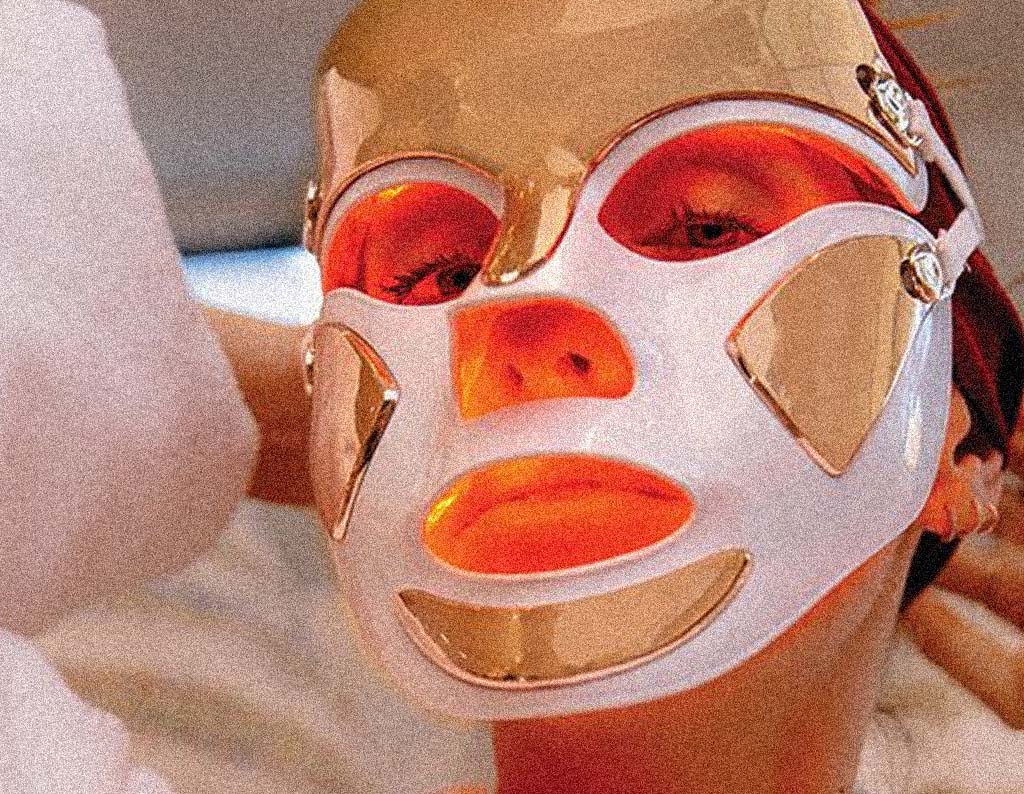
The Science Behind LED Therapy: Does It Actually Work?
In short, yes. The world of skincare has seen plenty of welcome advancements in recent years, and one of the most innovative is the use of light therapy. LED masks, in particular, have risen to fame since they’re able to address all the well-known (& unwanted) skin concerns such as acne, fine lines, and wrinkles. The main benefit with the latest wave of devices is the potential to get that same professional-grade light therapy right in the comfort of your own home. & since it’s in mask form, it means you can sit and watch the latest series of Buying Beverly Hills whilst getting your treatment in.
LED therapy, or light therapy, utilises specific wavelengths of light to target skin cells and stimulate cellular responses. Different colours of light have different effects on the skin, making LED therapy a great treatment option for various skin concerns. & if you’re like me, and suffer with a fair few of them, then the ability to switch between the different light modes is a major bonus (where are my sensitive, acne-prone but also now ageing skin type girlies at?!).
The Dr. Dennis Gross LED mask includes red and blue therapy. The red light helps to address signs of ageing by reduce the appearance of fine lines and wrinkles, while the blue light targets acne-causing bacteria and reduces inflammation.
You might be aware already, but the specific wavelengths of light used in LED therapy are key to achieving the results your hoping for (I’ll get into this more later!). Red light, for example, has a longer wavelength and can penetrate deeper into the skin, making it effective at stimulating collagen production. Blue light, on the other hand, has a shorter wavelength and targets acne-causing bacteria, making it great at reducing inflammation & breakouts. But not all masks are created equal, with many using wavelengths that haven’t actually been shown to be effective.
It’s also worth noting that unlike a lot of facial treatments on the market (aka, lasers & fillers), using a mask like the SpectraLite is non-invasive and painless. All it requires is your time investment & a bit of patience, which I know first-hand is tough when you’re struggling with your skin.
Understanding How LED Light Affects the Skin
LED light therapy works by delivering specific wavelengths of light to the skin, which then interacts with the skin cells to produce various therapeutic effects. The different colours of LED light have different effects on the skin, making it important to understand how each colour can address your specific skin concerns.
Red light therapy has a longer wavelength and can penetrate deeper into the skin. It stimulates the production of collagen, a protein that plays a crucial role in maintaining the skin’s elasticity and firmness. By increasing collagen production, red LED light can help improve the appearance of lines and wrinkles, promoting overall skin rejuvenation. Hello glowy plump skin!
Blue light therapy, on the other hand, has a shorter wavelength and targets the bacteria that cause acne. It can help reduce inflammation and kill the bacteria, leading to clearer & less congested skin.
Some LED masks, like the Dr. Dennis Gross face mask, offer different light settings that combine both red and blue light (we love a multi-tasking queen). This combo makes it the perfect option for my acne-prone & ageing skin. Plus, if I’m ever finding my skin feels more sensitive than usual (aka, I’ve overdone it with my Medik8 Crystal Retinal), then I opt for the red light instead of the mix to give my skin a break.
Why Did I Choose The Dr Dennis Gross LED Mask?
There’s plenty on the market, so why choose the one that is over £450?
Well, the Dr Dennis Gross SpectraLite ticked all the boxes when it came to irradiance (e.g. powder density), wavelength and also the dose (how long it needs to be used for). & I’d recommend before buying any device, you check for these features too.
| Mask | Irradiance (mW/cm2) | Wavelength (nm) | Dose / Treatment Time |
|---|---|---|---|
| Dr Dennis Gross Faceware Pro | 60 | 415, 605, 630, 660 & 880 | 3 minutes |
| CurrentBody Skin | 30 | 633 & 830 | 10 minutes |
| Omnilux Contour | 35 | 633 & 830 | 10 minutes |
Irradiance
First up (& this isn’t spoken about enough) – the irradiance of the device really matters. This is basically the strength of the lights in the mask. Regardless of how many are across the mask, you want to make sure that your lights are in the range that’s shown to be effective at penetrating the skin. Typically, that means it needs to be at around 35-150 mW/cm2. SpectraLite Pro comes in at an impressive 60 nW/cm2, which is the sweet spot for at-home devices. From experience, any higher & the devices can start to make your face feel quite hot, which isn’t ideal if you’re planning to use it quickly before you head out.
Wavelengths
In terms of wavelengths, it also hits the mark. It is sometimes criticised for having wavelengths in the red setting that are non-standard e.g. 605 nm and 660nm, alongside more typical 630nm. Since studies have shown that 633nm is the gold standard for red light wavelengths, the inclusion of the 630nm wavelengths is great. Now it doesn’t mean that the 660nm or 605nm aren’t going to be effective, it’s just not as evidence-backed.
Dose
This was the final thing that sold me on the device – unlike the popular CurrentBody mask that needs 10 minutes per treatment, this one only needs 3. It’s such a low commitment for the benefits, we’ve all got 3 minutes to spare in a day, so I found it made it much easier to stay consistent with it.
Other Features I Liked (Theres a Few!)
Are There Any Drawbacks?
Not everyone loves the hard shell, mainly because it does take up more space when you’re not using it. I personally like that it’s a hard – it feels more premium & durable than those like the CurrentBody or Omnilux, & that it’s getting into the contours of my face better. But, because it’s hard, it’s not going to fit every face shape (Dr Dennis Gross, if you’re reading this, you should have a size guide!). The strap that goes around the mask has also caused some complaints – I found I needed to add a knot into mine to make sure it was tight enough (I do have a pea-sized head though), but after that, it was perfectly fine.
One other thing worth noting is that the red to blue ratio is not customisable – so you can’t just set it to be blue around your chin, for example. For me, this has been fine despite my sensitive skin, but if you’re ultra-sensitive and also have combination skin, the blue light setting might not be for you. If this sounds like you, I’d recommend the Qure mask instead – it’s similar to the Dennis Gross mask in terms of the led technology, but you can also customise where the blue light is targeting.
Comparing Before and After Results Using Dr Dennis Gross SpectraLite
If you’re here, I expect you’ve probably seen some of these already! Here are some of the best results I’ve seen online from other users.
@madeleinewould gives her honest review on the impact it’s had on her breakouts.
@madeleinewould ♬ original sound – Madeleine
@deesibrian shares her impressive before and after results so far.
@deesibrian Dr. Dennis Gross Skincaregiftedme #drdennisgrossgiftedme celebrating LED week with my faceware Pro Mask from @Dr. Dennis Gross Skincare #drdennisledmask #ledmask #skin #skincare #skincareroutine #acne #acnescars #acnefighter #acnetransformation #collagen #blemishes #deesibrian ♬ Chopin Nocturne No. 2 Piano Mono – moshimo sound design
Below is from a skincare Reddit, admittedly posted a few years ago, showing the difference it made in just 5 days.
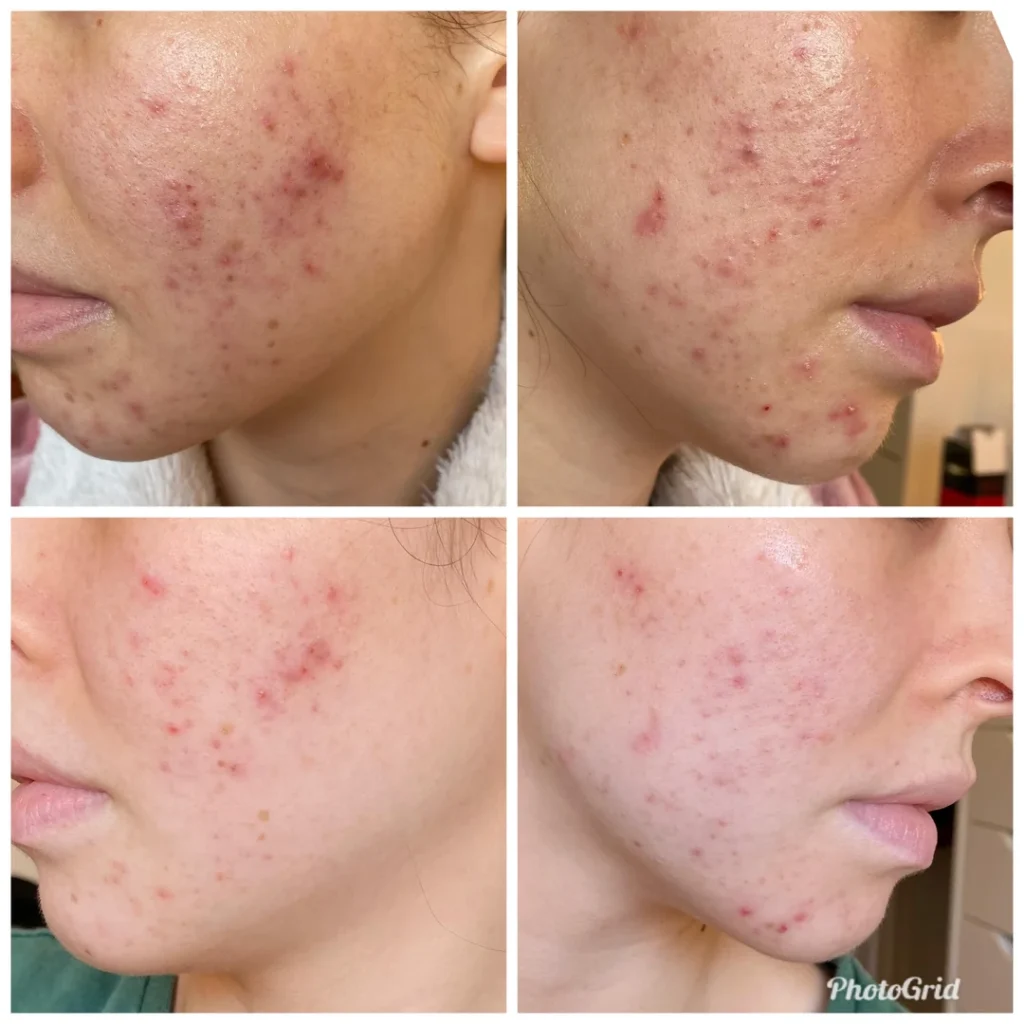
For me, the biggest difference I’ve noticed after 3 months of use is mostly my frown lines seem to have softened and my breakouts are less intense. They still happen, don’t get me wrong, but theres been an overall improvement. Plus, they now clear up quicker & future breakouts are less angry when they come too. My skin texture & skin tone without a doubt looks more even too, which seems to be a common benefit reported from other users.
Is It Good Value For Money?
Theres no beating around the bush here – it’s an investment for sure. For me, I was paying roughly £25-40 to use the Dermalux light at my local salon. So over the past year, I’ve spent at least £300 on one-off uses. At the salon, I have to sit there for 30 minutes too, so it’s a much bigger time investment. Let’s girl math. If you’re using it even just 5 days per week, for a year, it works out at around £1.78 per use. & considering it will last you much longer than a year, I’d say it’s definitely worth the price tag.
Other Options For LED Therapy
If you’re not sold on the idea of a hard mask, then the best softer shell masks would be the ones from CurrentBody and Omnilux. Still powerful light therapy devices, but not on par with the SpectraLite (30mW/cm2 vs 60mW/cm2).
Or, if actually a mask isn’t your thing, there’s some incredible panels out there. Mito & Hooga are reputable brands that I’d recommend.
The DR Verdict
Granted, the Dennis Gross mask isn’t for everyone, but I can understand why it’s so popular. It includes some of the best science-backed tech out there, it’s easy to use & requires a super low commitment, making it easy to add into your skincare routine. It’s customisable – the ability to switch between three modes is a huge plus as it can adapt to whatever your skin throws at you. & let’s not forget, it’s low maintenance too. There’s no pre-treatment gel required, you can cleanse your face & carry on with whatever you were doing in just three minutes. So if you’re ready to step up your skincare game, you won’t regret investing in the SpectraLite Faceware Pro.
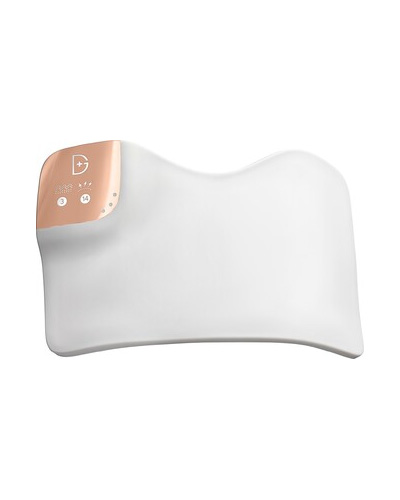
Harvey nichols
Dr Dennis Gross SpectraLite BodyWare Pro
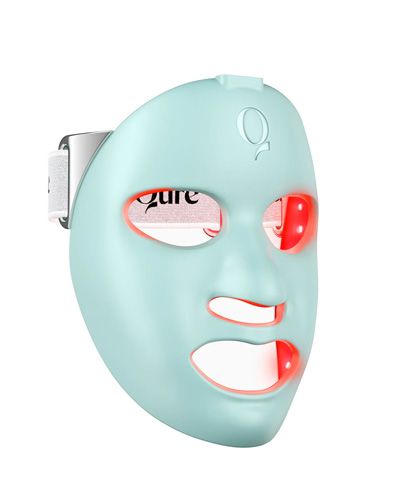
CULT BEAUTY
QURE SKINCARE Q-REJUVALIGHT PRO
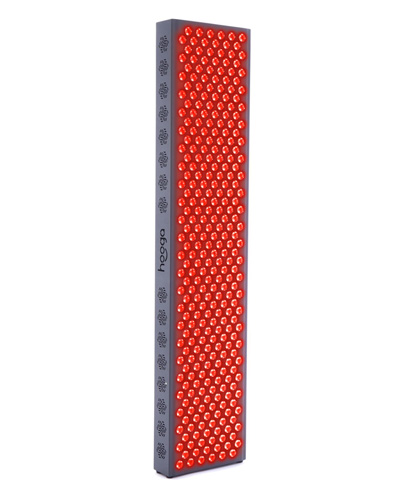
HOOGA
HOGA RED LIGHT THERAPY PANEL
PS. All of the linked products are independently selected and curated by the lovely Daily Rituals team. If you love and buy something we link to, we may earn commission.

